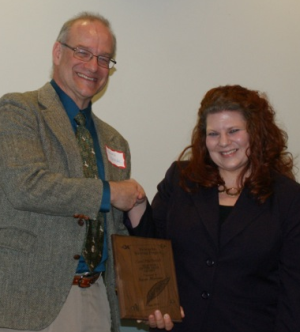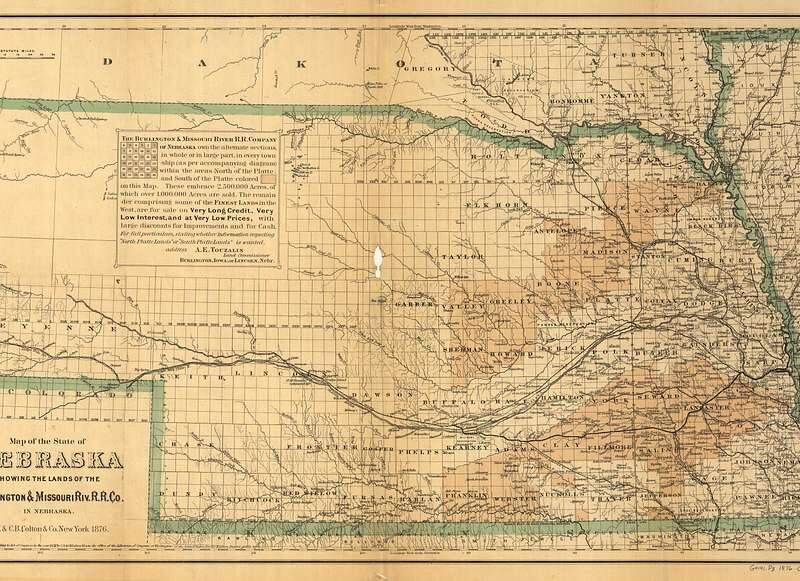Transcript of presentation speech by Robert Brooke, NeWP Director

I am pleased to present the 2013 Nebraska Writing Project Carol MacDaniels Teacher of the Year Award to Susan Martens.
For the past five years, Susan has taught in the University of Nebraska-Lincoln English Department, following a successful earlier teaching career at Arlington High School in east central Nebraska. She’s been active in the Nebraska Writing Project since her first Rural Institute experience, in 2001 at Cedar Bluffs. Since that first institute, Susan has held almost all of NeWP’s leadership roles. She’s been Co-Director, Institute Facilitator, Professional Writing Retreat Facilitator, Technology Team grant writer, Web Editor, Advisory Board member, and self-appointed Writing Marathon Wrangler. In short, Susan has been, as one of her colleagues puts it, “a force of nature” for Nebraska Writing Project. Next year, she leaves Nebraska to take up the Directorship of the Prairie Lands Writing Project at Missouri Western University. Her future colleagues in Missouri, who can’t be with us tonight, sent me two pages of support for this award — first, welcoming Susan to their NWP site as the “fulfillment of Prairie Lands’ dream”; second, pointing out “the shift in superlative mascot” that goes with the move. At Missouri Western, she’ll have a “magnificent mythical {griffin},” replacing UNL’s “bobble-headed blond boy in red rompers.”
Susan’s Nebraska colleagues call her an “artist-scholar-philosopher-humanitarian-practitioner,” “the mother of the writing marathon,” and “the consummate writer, teacher and learner, modeling and living what she teaches.” They emphasize that Susan exhibits all three traits we honor in the Carol MacDaniels Teacher of the Year Award: a teacher who inspires students, an advocate for teachers as professionals, and a writer herself.
Susan’s students certainly speak to her inspiration. One of her Arlington High School students, now years after graduation, wrote me to say:
Susan is one of the teachers that students remember. It’s impossible to take a class with her and not become consumed with what you’re learning. Upon my graduation, Susan wrote inside a brown hard bound notebook “future Emmy winning screenwriter” and it’s still one of my prize possessions. It’s because she was my teacher that I want to pursue a career in writing.
Another former student, now in film school in Chicago, sends this message:
As a child, I thought that Webster had to define you before you could come off as a legitimate form. That was before I met a woman who spoke of advocacy and passion. Thank you Susan for saving my life. You whispered “you can” in a field of doubt. P.S. – We fly freak flags as writers, put simply. Get used to it.
Susan is equally inspiring to UNL preservice English educators. One, now finishing her second year of full time teaching, writes:
On the first day of your class, I was in awe as I absorbed your radiant showers of personality. From your floor length, flowing dress to the fiery color of your hair, I knew you had the spunk to inspire. Through theory, personal interactions, and the tiniest of anecdotes, your influence goes beyond me and into the rippled waves of my own students, and those thereafter.
Another, a bit more prosaic, adds:
Susan created a partnership with North Star High School, where we worked with students who were struggling to pass the exit writing exam. I worked with a young man who opened my eyes to struggles I have never experienced. With Susan’s support, I watched this young man who claimed to hate reading and writing work through personal issues by interacting with a novel. To me, any English teacher would give anything to see that happen, and I could not have experienced it for the first time without Susan.
A final preservice educator writes:
Susan explained that being a teacher means being able to make a hundred decisions every minute. A teacher must balance the needs of each student, the class as a whole, as well as personal integrity—Susan is a teacher who is able to do this work completely seamlessly.
These preservice educators point toward Susan’s stellar work as a teacher leader, someone who values the professional work of teaching and advocates for it. This aspect of Susan’s leadership is highlighted by her NeWP colleagues. One writes:
It was my privilege to work with Susan at the first Nebraska Writing Project Professional Writing Retreat. As I watched her conference with writers, I quickly grew to admire Susan’s thoughtful silences which, like the music between notes, added to the fullness of shared ideas and words.
Susan’s colleagues cite her leadership on projects that affect the lives of teachers, from grants for new technology programs to assessments of the UNL composition programs to the development of positions statements for the NeWP website. But the most often mentioned professional program is the Writing Marathon. “{Because of Susan} our writing project has been on at least twenty marathons spanning the state,” writes one colleague, “the gift of the writing marathon will continue giving to generations of NeWP teacher consultants.” Another colleague embellishes:
Susan’s work with Writing Marathons has impacted my writing and teaching—perhaps more significantly than anything else in my teaching career. It was on these writing marathons that my own personal writing evolved in ways it hadn’t before. Susan’s writing marathons gave us the time and space to write that hectic teaching life doesn’t often allow for. I now conduct regular writing marathons with my high school students—moving in and writing about our high school campus—where we spend so much time but are not always noticing or watching. When we take time to write, students begin to think and write deeply about how this place shapes us and who we are in it.
Susan is credited, through her advocacy of the writing marathon, for helping us recenter our teaching lives in our own writing. This isn’t surprising, since Susan is such an accomplished writer herself. She leaves UNL with several publications, two graduate school writing awards, and a list of presentations almost a page long. These writings range from teaching Lord of the Flies to the rhetoric of ballroom dance, and all are graced by a lively personal voice. I’d like to close by reading a short piece of Susan’s writing, from a web project she organized called “Twelve Stories About the Nebraska Writing Project I Never Told You.” I think it captures Susan’s voice, her commitment to the spirit of the Writing Project, and the personal trait one of her colleagues names when he says “Everywhere she travels, she touches lives and leaves people happier than they were before they met her.” Here are her words:
It was the first read-around of the 2006 Summer Institute. I’m sure I had some raging cold because I remember being late back to the classroom after running upstairs to down some cough syrup, remember the pain of trying not to cough during other people’s readings. I remember that I had read my poem about a transformative sushi experience and that I was feeling very proud of myself. “The Buddha, the Laguna, and the Spicy Tuna,” I think I called it.
But what I remember most was my friend reading her story about her miscarriage. I’d read an earlier draft of the story and responded to it, so I knew where the story was headed and I remember feeling such empathy and tension for the whole room of people who were hearing it for the first time—that whole dramatic irony thing we love to teach our students about. I was nervous for them, nervous for my friend, and nervous for myself because I am prone to bawling my eyes out at Nebraska Writing Project read-arounds.
I remember how one of her group members sat beside her, gently rubbing the back of her shoulder as she talked. And as we all sat there trying hard to remain composed, I remember feeling that we were bearing witness there together, lending her courage through our listening. I remember feeling the whole moment open up then and expand beyond the dark basement classroom and the fluorescent lighting. That class wasn’t just a class anymore — not even just a NeWP Institute. We had achieved for ourselves that which we always hope our students will have: a community of writers, writing into the world to see what we can teach and learn together.
Please join me in honoring Susan Martens as the Nebraska Writing Project Carol MacDaniels 2013 Teacher of the Year.
Robert Brooke, Director, Nebraska Writing Project, 3 May 2013


